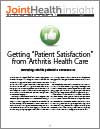In this issue
- Getting “Patient Satisfaction”from Arthritis Health Care
- ra matters
- What matters to you in your arthritis experience?
- RA narRAtive
- What is your arthritis experience?
- Creating a Global RA Network
- Arthritis Consumer Experts’ #ArthritisMadLibs Twitter Campaign
- Raising Arthritis Awareness: It’s Up to All of Us
JointHealth™ insight Published September 2017

Getting “Patient Satisfaction” from Arthritis Health Care
Surveying arthritis patients to advance care
Arthritis Consumer Experts (ACE) was founded by a person with arthritis 18 years ago to help other Canadians diagnosed with arthritis by providing them science-based information and education and support them in their journey with the disease while advocating for equitable health care for all. Every day since, we have helped hundreds of thousands get what they need from their health care team, and help them talk about their arthritis diagnosis with their family, friends, co-workers and employers.
Over the years, we have seen the arthritis landscape change dramatically with advancements in understanding about primary and secondary prevention strategies in osteoarthritis and inflammatory arthritis, diagnosis, treatment and management of these and other types of the disease. Today, recent research on arthritis models of care – how people get diagnosed and the care pathway they experience in their life with their disease – response to treatments, and issues about staying on therapy has identified patient dissatisfaction with their arthritis care.
So, to stay true to ACE’s mission, we want to further our understanding of these and other important patient experience and satisfaction issues and share with you research “by, for and with” people with arthritis to help improve your lives, and to (em)power you to speak out about what is important to you.
In this issue of JointHealth™ insight, we highlight three international surveys ACE helped lead, and ask for your views and guidance to drive our work in 2018. With you, our member and subscriber, we want to continue leading the arthritis consumer-patient community to improve the way health care is delivered to patients with all types of arthritis by the rheumatologists, allied health professionals, health policy decision makers and others who provide them with care.
What patient advocates leaders are saying
For more information on the #RAMatters survey and to explore the findings, please visit: http://ramatters.ca.
Why #RAMatters
A foundation behind the #RAMatters survey is the growing research around patient-reported outcomes that capture the true physical and emotional burden of life with RA and help patients and their healthcare provider to identify the most important personal goals for people living with the disease. Interest in patient reported outcomes continues to grow in RA as part of a global trend to develop “patient-centred” treatments and models of care.

The RA NarRAtive initiative involved the survey of patient perspectives in the management of RA. The patient survey was fielded in 15 countries around the world and designed to evaluate the patient experience and their satisfaction with treatment and disease management. (A companion survey with similar questions interviewed rheumatologists from 15 countries.)
What they found:
The survey revealed that a patients’ perception of their RA and its treatment, as well as their relationship with their healthcare provider, impacts the management and the outcomes of their disease. It also illustrates that, together, RA patients and their rheumatologists can better communicate and understand one another’s views to achieve the best possible outcomes for patients.
For more information on the RA NarRAtive survey and to explore the findings, please visit: http://www.pfizer.com/news/press-kits/ra-narrative.
What patient advocates are saying
Why it matters
The survey highlights the need to elevate the patient voice in the conversation around RA disease management and treatment goals and preferences, in order to enhance shared decision-making practices and improve patient outcomes.
Creating a Global RA Network
Arthritis Consumer Experts has helped lead the formation of a Global RA Network made up of consumer community leaders and member organizations from around the world. ACE convened a working group and consulted with them to develop the methodology and questions for a global survey on models of RA care and barriers to optimal RA treatment.
The global survey aims to identify how, from the patient experience and perspective, current models of care for rheumatoid arthritis compare between countries. The survey findings will be presented at the upcoming American College of Rheumatology Annual Scientific Meeting, November 2017.
Based on survey findings, the Global RA Network will develop education and information initiatives to improve RA patients’ understanding about the kind and quality of care they should be receiving to enable the best treatment outcomes possible.
Arthritis Consumer Experts’
#ArthritisMadLibs Twitter Campaign
Arthritis Consumer Experts (ACE) is celebrating Arthritis Awareness Month with the #ArthritisMadLibs Twitter Project. The success of the RA Matter and RA NarRAtive projects have inspired ACE to create a light-hearted version of survey questions through the Mad Libs format. The goal is to help others understand the impact of arthritis and make informed decisions about the development of new arthritis programs that will benefit patients and their caregivers.
Mad Libs is a word game where key words in a sentence are left intentionally blank for others to fill in with their own words. As we continue to learn from the global arthritis patient surveys, communications is critical between patients and their doctors, rheumatologists, nurses, pharmacists, friends, colleagues and researchers. #ArthritisMadLibs is a chance to re-write the arthritis patient story – one word at a time.
During Arthritis Awareness Month, ACE will be tweeting arthritis-themed Mad Libs. To participate, please follow hashtag #ArthritisMadLibs on our Twitter account @ACEJointHealth. If you do not have a Twitter account but would like to participate, you can follow our Twitter feed on the Arthritis Consumer Experts website (www.jointhealth.org) and email your answers to feedback@jointhealth.org. To drive the campaign, please like, retweet, and reply on Twitter. Arthritis Broadcast Network (www.arthritisbroadcastnetwork.org) will be providing a weekly summary of the Mad Libs.
Listening to you
We hope you find this information of use. Please tell us what you think by writing to us or emailing us at feedback@jointhealth.org. Through your ongoing and active participation, ACE can make its work more relevant to all Canadians living with arthritis.
Update your email or postal address
Please let us know of any changes by contacting ACE at feedback@jointhealth.org. This will ensure that you continue to receive your free email or print copy of JointHealth™ insight.
Arthritis Consumer Experts (ACE)
Who We Are
Arthritis Consumer Experts (ACE) provides research-based education, advocacy training, advocacy leadership and information to Canadians with arthritis. We help empower people living with all forms of arthritis to take control of their disease and to take action in healthcare and research decision making. ACE activities are guided by its members and led by people with arthritis, leading medical professionals and the ACE Advisory Board. To learn more about ACE, visit: www.jointhealth.org
Acknowledgements
Over the past 12 months, ACE received grants-in-aid from: Amgen Canada, Arthritis Research Canada, AstraZeneca Canada, Canadian Biosimilars Forum, Canadian Institutes of Health Research, Celgene, Eli Lilly Canada, Hoffman-La Roche Canada Ltd., Merck Canada, Novartis, Pfizer Canada, Sandoz Canada, Sanofi Canada, St. Paul’s Hospital (Vancouver), UCB Canada, and the University of British Columbia.
ACE also receives unsolicited donations from its community members (people with arthritis) across Canada.
ACE thanks funders for their support to help the nearly 5 million Canadians living with osteoarthritis, rheumatoid arthritis, psoriatic arthritis, ankylosing spondylitis and the many other forms of the disease. ACE assures its members, academic and healthcare professional collaborators, government and the public that the work of ACE is free from influence of its funders.
Disclaimer
The material contained on this website is provided for general information only. This website should not be relied on to suggest a course of treatment for a particular individual or as a substitute for consultation with qualified health professionals who are familiar with your individual medical needs. Should you have any healthcare related questions, you should contact your physician. You should never disregard medical advice or delay in seeking it because of something you have read on this or any website.
This site may provide links to other Internet sites only for the convenience of World Wide Web users. ACE is not responsible for the availability or content of these external sites, nor does ACE endorse, warrant or guarantee the products, services or information described or offered at these other Internet sites.
Although the information presented on this website is believed to be accurate at the time it is posted, this website could include inaccuracies, typographical errors or out-of-date information. This website may be changed at any time without prior notice.

Getting “Patient Satisfaction” from Arthritis Health Care
Surveying arthritis patients to advance care
Over the years, we have seen the arthritis landscape change dramatically with advancements in understanding about primary and secondary prevention strategies in osteoarthritis and inflammatory arthritis, diagnosis, treatment and management of these and other types of the disease. Today, recent research on arthritis models of care – how people get diagnosed and the care pathway they experience in their life with their disease – response to treatments, and issues about staying on therapy has identified patient dissatisfaction with their arthritis care.
So, to stay true to ACE’s mission, we want to further our understanding of these and other important patient experience and satisfaction issues and share with you research “by, for and with” people with arthritis to help improve your lives, and to (em)power you to speak out about what is important to you.
In this issue of JointHealth™ insight, we highlight three international surveys ACE helped lead, and ask for your views and guidance to drive our work in 2018. With you, our member and subscriber, we want to continue leading the arthritis consumer-patient community to improve the way health care is delivered to patients with all types of arthritis by the rheumatologists, allied health professionals, health policy decision makers and others who provide them with care.
 |
#RAMatters was an international survey of 6,208 people from eight participating countries (Canada, France, Germany, Italy, Netherlands, Spain, Sweden and the United Kingdom) designed to explore the outcomes and quality of life related areas that are most important, relevant and impactful to patients living with rheumatoid arthritis (RA) and rarely researched or written about. Using an innovative visual data collection method on a live web platform, the RA Matters survey allowed people to see and compare their results in real time with people in participating countries. |
What #RAMatters Uncovered
|
 |
“RA can often be unpredictable. Some people experience long periods of disease inactivity then flare unexpectedly, whilst others have highly active disease with symptoms on a daily basis lasting for months at a time. These fluctuations can often lead to feelings of distress, lack of control, isolation and may limit people’s hopes for the future,” said Clare Jacklin, Director of External Affairs, NRAS, UK. “The RA Matters survey has provided a platform for people living with RA to voice what really matters to them. Life with RA should not be a compromise. It should be about taking control of this debilitating disease and not having your life defined by it.” |
For more information on the #RAMatters survey and to explore the findings, please visit: http://ramatters.ca.
Why #RAMatters
A foundation behind the #RAMatters survey is the growing research around patient-reported outcomes that capture the true physical and emotional burden of life with RA and help patients and their healthcare provider to identify the most important personal goals for people living with the disease. Interest in patient reported outcomes continues to grow in RA as part of a global trend to develop “patient-centred” treatments and models of care.
| Patient Reported Outcomes are reports coming directly from patients about how they feel or function in relation to their RA and its therapy without interpretation by healthcare professionals. |
 What matters to you in your arthritis experience? ACE is interested in finding out from you what impact your arthritis has on your personal relationships and ability to work. If you are living with a type of arthritis and want to help advance ACE’s important work, please complete our anonymous online survey: www.surveymonkey.com/r/JHIWhatMattersSurvey |
| Note to our readers: This project was ethically funded by Eli Lilly’s European office. Survey themes and development was led by an international panel of arthritis patients, educators and clinical experts. ACE’s participation was in keeping with our guiding principles and approved by our advisory board. |

The RA NarRAtive initiative involved the survey of patient perspectives in the management of RA. The patient survey was fielded in 15 countries around the world and designed to evaluate the patient experience and their satisfaction with treatment and disease management. (A companion survey with similar questions interviewed rheumatologists from 15 countries.)
What they found:
The survey revealed that a patients’ perception of their RA and its treatment, as well as their relationship with their healthcare provider, impacts the management and the outcomes of their disease. It also illustrates that, together, RA patients and their rheumatologists can better communicate and understand one another’s views to achieve the best possible outcomes for patients.
|
Key findings of the RA Narrative Global Patient Survey included:
|
What patient advocates are saying
 |
“We encourage people with RA to contact ACE and other patient organizations for more information on preparing for medical visits, setting disease management goals and preparing the right questions to ask in order to improve their RA treatment and communication with their physician,” said Cheryl Koehn, President, Arthritis Consumer Experts. “The RA Narrative Global Patient Survey represents the views of more than 4,000 RA patients around the world, and the views of their healthcare providers in the companion survey, were the road map for the development of JointHealth™ Education" http://info.jointhealth.org/jhed-landing-page. |
Why it matters
The survey highlights the need to elevate the patient voice in the conversation around RA disease management and treatment goals and preferences, in order to enhance shared decision-making practices and improve patient outcomes.
 What is your arthritis experience? ACE is interested in identifying your information needs and exploring gaps between patient and healthcare professional dialogue. If you are living with a type of arthritis and want to help advance ACE’s important work, please complete our anonymous online survey: www.surveymonkey.com/r/JHIArthritisExperienceSurvey |
Creating a Global RA Network
Arthritis Consumer Experts has helped lead the formation of a Global RA Network made up of consumer community leaders and member organizations from around the world. ACE convened a working group and consulted with them to develop the methodology and questions for a global survey on models of RA care and barriers to optimal RA treatment.
The global survey aims to identify how, from the patient experience and perspective, current models of care for rheumatoid arthritis compare between countries. The survey findings will be presented at the upcoming American College of Rheumatology Annual Scientific Meeting, November 2017.
Based on survey findings, the Global RA Network will develop education and information initiatives to improve RA patients’ understanding about the kind and quality of care they should be receiving to enable the best treatment outcomes possible.
What is a model of care for RA?
Why it matters Meeting all five elements of a RA model of care will help create a pathway of care, from prevention, diagnosis, treatment and shared care and self-care to ensure the RA patient has access to what they need at the right time in their journey. The Global RA Network and the findings from its international survey will provide member organizations with RA evidence-based education, information and advocacy leadership to overcome barriers to an optimal RA model of care and raise awareness of common goals for RA care in their country. |
 What is your arthritis experience? As a person living with a type of arthritis, sharing your experiences about the care you receive or give to yourself in your province is vitally important. If you are living with a type of arthritis and want to help advance ACE’s important work, please complete our anonymous online survey: www.surveymonkey.com/r/JHIModelsofCareSurvey |
Arthritis Consumer Experts’
#ArthritisMadLibs Twitter Campaign
Arthritis Consumer Experts (ACE) is celebrating Arthritis Awareness Month with the #ArthritisMadLibs Twitter Project. The success of the RA Matter and RA NarRAtive projects have inspired ACE to create a light-hearted version of survey questions through the Mad Libs format. The goal is to help others understand the impact of arthritis and make informed decisions about the development of new arthritis programs that will benefit patients and their caregivers.
Mad Libs is a word game where key words in a sentence are left intentionally blank for others to fill in with their own words. As we continue to learn from the global arthritis patient surveys, communications is critical between patients and their doctors, rheumatologists, nurses, pharmacists, friends, colleagues and researchers. #ArthritisMadLibs is a chance to re-write the arthritis patient story – one word at a time.
During Arthritis Awareness Month, ACE will be tweeting arthritis-themed Mad Libs. To participate, please follow hashtag #ArthritisMadLibs on our Twitter account @ACEJointHealth. If you do not have a Twitter account but would like to participate, you can follow our Twitter feed on the Arthritis Consumer Experts website (www.jointhealth.org) and email your answers to feedback@jointhealth.org. To drive the campaign, please like, retweet, and reply on Twitter. Arthritis Broadcast Network (www.arthritisbroadcastnetwork.org) will be providing a weekly summary of the Mad Libs.
Raising Arthritis Awareness: It’s Up to All of Us
September is Arthritis Awareness Month in Canada and raising the profile about the group of over 100 diseases is up to all of us. One simple but important way you can help is by sending a “letter to the editor” to your local newspaper. Here is a sample letter for ACE consumers and patients to use or customize. Thank you for participating!|
The Editor The Daily Record Some City, Somewhere Dear editor, Arthritis is a chronic disease that has a devastating effect on the lives of approximately 5 million Canadians. I’m one of them and chances are you know someone who is affected. In addition to the burden of pain faced every day by individuals like me living with arthritis, arthritis is the leading cause of disability in Canada. Due to increased longevity, reduced physical activity, increasing obesity and lack of access to timely health care, the burden of arthritis is increasing. Within a generation, more than 10 million (one in four) Canadians are expected to have either osteoarthritis or rheumatoid arthritis, the two most common forms of arthritis. Early intervention and treatment from a rheumatologist can improve the quality of life for people like me. However, many Canadians do not receive timely and effective arthritis care. That’s why I am encouraging your readers to learn more about models of care for arthritis during Arthritis Awareness Month in Canada this September. Arthritis community leaders are working to develop and implement these models of care to improve the way health care is delivered to patients. Arthritis Alliance of Canada has useful information at http://www.arthritisalliance.ca/en/. I am also urging arthritis patients to share their crucial perspectives with health policy decision makers, rheumatologists, allied health professionals and other health care providers who care for them. Patient-centred care is difficult to deliver without patient-centred outcomes information. It’s up to us to ensure the patient voice is heard about ways to improve arthritis prevention and quality of care so we can help more people get the care they need now or in the future. Yours sincerely A Reader |
Listening to you
We hope you find this information of use. Please tell us what you think by writing to us or emailing us at feedback@jointhealth.org. Through your ongoing and active participation, ACE can make its work more relevant to all Canadians living with arthritis.
Update your email or postal address
Please let us know of any changes by contacting ACE at feedback@jointhealth.org. This will ensure that you continue to receive your free email or print copy of JointHealth™ insight.
Arthritis Consumer Experts (ACE)
Who We Are
Arthritis Consumer Experts (ACE) provides research-based education, advocacy training, advocacy leadership and information to Canadians with arthritis. We help empower people living with all forms of arthritis to take control of their disease and to take action in healthcare and research decision making. ACE activities are guided by its members and led by people with arthritis, leading medical professionals and the ACE Advisory Board. To learn more about ACE, visit: www.jointhealth.org
Acknowledgements
Over the past 12 months, ACE received grants-in-aid from: Amgen Canada, Arthritis Research Canada, AstraZeneca Canada, Canadian Biosimilars Forum, Canadian Institutes of Health Research, Celgene, Eli Lilly Canada, Hoffman-La Roche Canada Ltd., Merck Canada, Novartis, Pfizer Canada, Sandoz Canada, Sanofi Canada, St. Paul’s Hospital (Vancouver), UCB Canada, and the University of British Columbia.
ACE also receives unsolicited donations from its community members (people with arthritis) across Canada.
ACE thanks funders for their support to help the nearly 5 million Canadians living with osteoarthritis, rheumatoid arthritis, psoriatic arthritis, ankylosing spondylitis and the many other forms of the disease. ACE assures its members, academic and healthcare professional collaborators, government and the public that the work of ACE is free from influence of its funders.
Disclaimer
The material contained on this website is provided for general information only. This website should not be relied on to suggest a course of treatment for a particular individual or as a substitute for consultation with qualified health professionals who are familiar with your individual medical needs. Should you have any healthcare related questions, you should contact your physician. You should never disregard medical advice or delay in seeking it because of something you have read on this or any website.
This site may provide links to other Internet sites only for the convenience of World Wide Web users. ACE is not responsible for the availability or content of these external sites, nor does ACE endorse, warrant or guarantee the products, services or information described or offered at these other Internet sites.
Although the information presented on this website is believed to be accurate at the time it is posted, this website could include inaccuracies, typographical errors or out-of-date information. This website may be changed at any time without prior notice.
